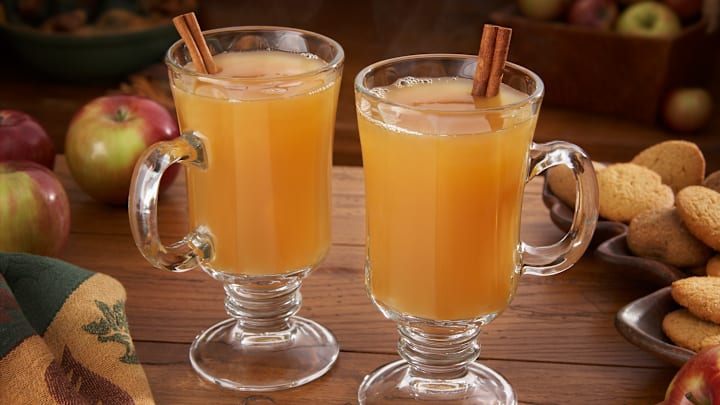What eggnog is to the winter holidays, so apple cider is to the fall. Amid falling leaves and blustery days, the tart drink is a beloved form of comfort food. But unless your seasonal schedule also involves gastrointestinal illness, you should know that not all apple cider is good apple cider.
According to Food & Wine, October is a good time to remind consumers that unpasteurized apple cider brings with it some degree of health risk. That’s because cider made from unwashed and freshly-squeezed apples could contain harmful bacteria like E. coli or Salmonella, both of which prompt highly unpleasant symptoms including diarrhea and vomiting. Parasites can also be present.
Such contaminants can come from soil, where bacteria or animal feces can reside, or from human contact on the surface of the fruit. And because there’s no way of reliably confirming how thoroughly produce has been cleaned, unpasteurized cider comes with a question mark.
It’s also possible for the cider itself to become compromised during production. Apples that arrive to facilities uncontaminated may acquire pathogens later on, potentially from existing bacteria on equipment.
Just how big is the risk of consuming untreated cider? While outbreaks of foodborne illness sourced to such drinks are uncommon, they can and do happen. Outbreaks of E. coli infection in California in 2015 and 2017 were both tied to unpasteurized apple cider. One analysis of apple cider made from apples grown in Connecticut found E. coli in 11 out of 314 samples, or 4 percent. Given the extreme unpleasantness of infection, the risk doesn’t appear to be worth it.
The Food and Drug Administration (FDA) states that apple cider and other fruit juices that are mass-produced are typically pasteurized, which involves the application of heat to destroy illness-causing bacteria. But some cider prepared in smaller, regional batches might not go through heat treatment. A farmers’ market is a likely place to find homemade cider, though unprocessed juices are sold at some grocery or health food stores as well.
While the FDA doesn’t mandate pasteurization in fruit juices, it does require labels to disclose the lack of it. The warning will typically appear as:
WARNING: This product has not been pasteurized and therefore may contain harmful bacteria that can cause serious illness in children, the elderly, and persons with weakened immune systems.
But there’s one loophole: No warning is required if the cider is sold by the glass. Someone at a market or juice bar may, for example, sell single cups instead of a jug and not have to disclose untreated ingredients.
If you insist on consuming untreated cider for its taste—and health experts don't recommend it, given the chance of illness—it’s best to keep unpasteurized juice refrigerated. Juice products that carry a warning label and have been left at room temperature should be avoided altogether.
For anyone opting to make their own cider, the FDA recommends washing produce with water as well as lopping off any damaged portions of fruit. You should do this even when peeling apples or other produce, as cutting into unwashed skin could conceivably transfer bacteria to the inner portion. It’s also a good idea to dry the fruit thoroughly before juicing. And if you want to be extra cautious, boiling the cider to kill off any remaining bacteria before consumption is also recommended.
